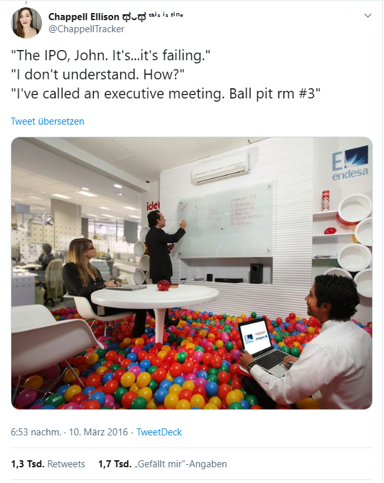This blog post is the fifth and final of a five-part series based on the keynote I presented at CamundaCon 2019 (You can find the recording on YouTube). You can read the first blog in this series here.
In essence, I recommend:
- Prioritizing customer-focused innovation.
- Bringing technology to the heart of your company.
- Automating your business, one project at a time.
- Putting executives in charge who care about long-term success, their people and the world.
Put Executives in Charge who care about long-term Success, their People and the World
I admit it is not easy to transform your organization in a way that ticks the three boxes we’ve discussed so far:
- Prioritizing customer-focused innovation.
- Bringing technology to the heart of your company.
- Automating your business, one project at a time.
Especially not for a big, perhaps publicly traded corporation. So at the end of the day, it’s all about the right leadership. Leadership will eventually make or break any organization’s future, and in this particular case, we need leaders that care about the following things.
It’s all about the long term
Amazon went public 22 years ago and that year Jeff Bezos sent a letter to his shareholders – a tradition he would be keeping up in the years to come. In that letter, he emphasized one thing, which he would be repeating every year: It’s all about the long term.
He elaborated that Amazon would invest with regards to long-term leadership, instead of short-term Wall Street reactions. That’s easier said than done, and in fact the Amazon stock price would stagnate for the next 10 years. However the following five years the stock price improved, and the five years after that even more.
If you want to truly transform your organization, you need to think long-term.
Better go get some Techies
Just like we’ve entered the age of the customer, we’ve also entered the age of the employee. At least when we think about tech talent. And if you want to become a tech company, you better go get some techies.

And many corporate leaders wonder: “How can we find, and keep and motivate the best tech talent?” Because frankly, they do not have a lot of experience with that. So they go on a school trip to Silicon Valley to visit some startups and hang out with the cool kids. They come back and go: “First thing we need is a ping pong table!” Because they are so impressed by those tech startup office layouts, the free perks and what not. But in reality, many great engineers don’t care about that too much. Sure they like it and appreciate it, but they truly care about something else, something very simple and something that any employee deeply cares about:

That their managers care about them. And I know it sounds obvious and not really new, but once again the reality proves that too many executives just don’t get it. Let’s look at an example:
Just imagine you’re visiting a company, for example because their executives want to get to know you before buying your product. So you’re welcomed by your contact person, and they show you around the IT department which is located in the building’s basement. And you’re thinking: “Hah, that looks a bit crowded. But hey, they’re on a mission, they’re all in this together, so never mind.”
But then your contact person becomes super nervous because it’s almost time for the meeting, and the CEO hates it when others are late. So they take you to the special elevator and you go directly all the way up to the 11th floor, step out and here you are on the executive floor. It’s the same floor layout basically, same amount of square feet as the basement. But it doesn’t host 400 people, but 10 C-Suite execs plus 10 personal assistants. And because there is just so much space, they’ve hung up famous paintings and brought in sculptures and what not so that the executives, when strolling around their floor in deep thought, have something delightful to enjoy.

And you’re seeing this and scratching your head: “How is this company ever supposed to attract, retain and motivate the best possible talent?”
So to make my point: No. As of today, caring leadership is not something generally understood in our economy. And just for the record, you can find the same phenomenon in tech startups, but there it might be the Founder CEO driving up the parking lot with their brand new Tesla while the employees are deprived of their free coffee because the company “is going through some rough times”.
And to be clear, caring leadership is not about “let’s all hug and sing kumbaya” every morning.
If necessary, you must challenge your employees directly, question their thoughts, dismiss their suggestions, criticize their results. You must be able to make the hard calls like moving people to different positions, demoting them or even letting them go. You must do all of that without hesitation, but you must never stop caring.
And too many executives seem to miss that, so they’re either overly aggressive or, more often, do not even have the guts to challenge directly and are insincere and manipulative instead. So just in case you haven’t heard of Radical Candor yet, it’s a book and you should read it.
Meaning and Purpose
A friend of mine works for a big German car manufacturer. And she feels that they care about her. She is really happy there, it’s a great employer. But she considers leaving them, saying: “Don’t get me wrong Jakob, it’s a great employer and personally I love to drive and ride my motorcycle and everything, but every morning I come to work, I cannot help but wonder:
‘Does the world need more cars?’.”
And I don’t have a strong personal opinion here, but generally the question of “Meaning and Purpose”, has become significantly more important, especially among younger talent that has other priorities than previous generations.
A few weeks ago you could read about a statement of corporate purpose coming from more than 180 US company CEOs, including, again, Amazon CEO Jeff Bezos. It is mostly symbolic, so far, but it is interesting that they are basically questioning the idea that corporations purely exist to serve shareholders. An idea that some have come to accept as kind of a general law of nature, when actually it is not.
One thing that might surprise you is that many venture capital firms are well aligned with the idea of caring about long-term success, about the people that work for you and about the world beyond your company’s boundaries. Perhaps even more than the public stock markets, which is one possible explanation why so many tech startups these days go public at a fairly late stage.
Time to Transform?
So here we are, certainly not a piece of cake, but then again it is called “Digital Transformation” and not digital “too little, too late”.
And if you’re ready to make this happen, we’re ready to help, so that together we can turn your organization into a true Digital Enterprise.
If you want to learn more about Camunda, come and join any of our free Camunda Days or independent Camunda Community meet-ups. Plus, you can always get in touch directly and our team will be happy to answer any questions you might have.


